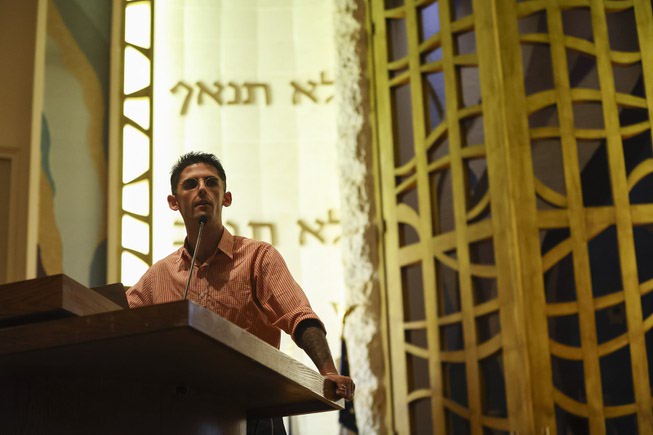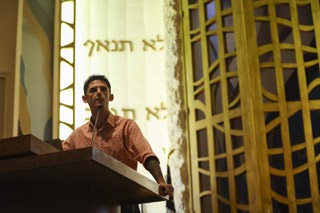
Shye Weinstein, 26, a survivor of the Oct. 7 Hamas massacre at the Supernova Sukkot Gathering music festival in Israel, shares his story of escaping the attack at Temple Beth Sholom in Las Vegas Tuesday, Nov. 28, 2023.
Thursday, Nov. 30, 2023 | 2 a.m.
Shye Weinstein had never been to a music festival before the Supernova dance gathering last month in the Israeli kibbutz known as Re’im.
And now he’ll likely never stop talking about it — but not for reasons most festivalgoers recall stories from an event.
“You’re looking forward to having a good time, looking forward to it being over, so you can go home and relax and eat,” said Weinstein, a 26-year-old native of Toronto who in April decided to move to Israel. “And (also) talk about what fun it was and how you can’t wait for the next one.
“But that wasn’t the case,” Weinstein continued in a talk Tuesday evening at Temple Beth Shalom in Summerlin.
That’s because more than 200 people were killed at the festival when Hamas launched an offensive across southern Israel. The unprecedented attacks led to nearly two months of fighting between Israel and Hamas, the extremist group charged with governing Palestinians in the Gaza Strip.
Roughly 1,200 Israelis were killed and many more injured in a series of Hamas attacks in Israeli towns.
The sides Wednesday were nearing the end of a temporary cease-fire to exchange Israelis taken captive Oct. 7 and Palestinian prisoners arrested since fighting began.
Weinstein told the audience Tuesday he wasn’t normally into electronic dance music and didn’t expect to enjoy the festival but was surprised to learn about the bright lights, creative spaces and welcoming atmosphere that festivalgoers worldwide enjoy.
He and his party had stayed up all night partaking in the festivities. By about 6 a.m. hundreds of rockets from Hamas and Israel’s Iron Dome started to light up the sky. It’s not unusual to see the occasional missile get intercepted, Weinstein added, but as the barrage continued he started to sense something bad was happening.
“I’ve never heard machine gun fire, not anything in real life — only in movies and video games,” Weinstein said. “But upon hearing that sound, it made me sweat. It made me more on edge than I already was.”
Within the hour, Weinstein and his friends joined others to leave the festival grounds. Machine gun fire began to ring out in the distance, he recalled.
The festival exit was clogged with a rush of people trying to flee, Weinstein said, leaving him and his friends to drive off-road in a small sedan to escape the complex and set off a frantic hours-long effort to escape the surrounding desert and get back on the road.
The further Weinstein and his friends got, he said, there was still no escaping the violence. Empty cars and dead bodies littered the road in many of the towns they passed by. They only stopped at military checkpoints.
Weinstein said he wanted to document he and his friends’ escape to ensure some evidence of the terror existed.
“I’m filming on my phone and I’m taking photos of the people around us because what else am I going to do when I’m in the passenger seat?” Weinstein said. I can only help look for a way out, take photos and videos, because something terrible is happening, and in case we die, I want there to be videos and photos of it.”
Since the attack, Weinstein has embarked on an international speaking tour to share his account, with his recent stops being at colleges throughout New England and in Canada.
Weinstein told the Sun the endeavor had been a tiresome one but was necessary to alert anyone willing to spread awareness of the atrocities he said no person should have to endure.
“Stopping your life is letting them (Hamas) win,” Weinstein said. “It’s OK to be sad and devastated over what occurred. We all are. But because of what happened, we have to continue to support each other and spread our love and stay united. We have to continue to have fun and laugh and go out for drinks with our friends and go to cafes — because if we don’t, they win. And they’re not going to win.”
Weinstein, who described himself as a photography enthusiast, shared with the crowd several photos and videos he took from inside the festival in the several hours that preceded the bloodshed. That included videos of him and his friends escaping the festival grounds en route to their home back in Tel Aviv, but also several portraits of fellow ravers that were initially for a photo essay.
Weinstein posted some of those photos and videos to social media after the attack in an attempt to find closure, but also to help identify his subjects and find out whether they survived.
Of the dozens he met and photographed, Weinstein said, two he later learned were killed.
“Every time I learn that one of these people that I met, that I engaged with, that I photographed was alive, it made me feel a bit less hopeless,” Weinstein said. “It made me feel a little bit better because that’s one person I don’t have to think about being dead.”
Yoshua Goodman, 27, of Las Vegas, thanked Weinstein for sharing his story. Goodman said he had previously lived in Israel, and the thought of living through such an attack was unfathomable.
“It’s something else when you see it in the news and when you hear somebody on TV speak about it,” said Goodman. “But when you hear someone who documented everything so meticulously with pictures, and for someone my age, it could have been me, it could have been my friends.… It’s still hard to believe what happened there. You just can’t believe people would do something like this.”
Others also said they were moved by Weinstein’s talk, including Leona Cohen, an 84-year-old Las Vegas resident who was wearing an oversized Israeli flag shirt worn by an Israeli who was taken hostage in 2006.
“I knew beforehand there was a need to go, and he just reinforced that,” she said.
Though the survivors are slowly healing, Weinstein said, Israelis are largely pitching into the recovery effort anyway they see fit; whether that’s tending to crops abandoned by communities impacted by the attacks, or simply supporting fellow Israelis through donating time or money to mental health resources.
“If you do want to help financially, there are ways you can donate that don’t involve anything government or military, you can donate,” Weinstein said. “That helps pay for people’s mental health care, because God knows everybody who lives outside of Tel Aviv and north of Tel Aviv needs it right now.”
Megan Weintraub, the chief philanthropy officer of the nonprofit Jewish Nevada, said Tuesday the organization has raised more than $682,000 since Oct. 7 to benefit relief efforts. That’s in addition to nearly $700 million raised by local Jewish federations across the U.S.
“One of the best ways I tell people they can help is to just exist — just be there and make sure that everybody knows you’re there and knows that you support them and are there for them,” Weinstein said.

